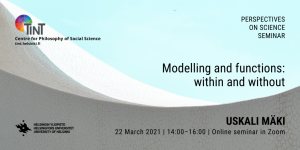
At the next Perspectives on Science seminar on Monday 22.3., Uskali Mäki (University of Helsinki) will give a presentation titled “Modelling and functions: within and without”. The seminar takes place in Zoom from 2 to 4 pm.
Perspectives on Science is a weekly research seminar which brings together experts from science studies and philosophy of science. It is organized by TINT – Centre for Philosophy of Social Science at the University of Helsinki. More information about the seminar here.
To receive the Zoom invitation, please sign up here.
Abstract:
As a cognitive activity, modelling can serve a variety of external functions, such as explanation, prediction, exploration, education, design, persuasion, and so on; and each of these comes in numerous possible further variants. The components of modelling, including idealizing assumptions, serve numerous functions within the activity, such as isolating causal mechanisms and securing mathematical tractability. The challenge of decomposition and coordination is to identify these functions and align them with one another; meeting this challenge is the burden of model commentary. All this has consequences for issues such as model evaluation and the sensible locus of truth ascription in modelling. The talk will summarize, expand, and refine my own past work, and will respond to some recent contributions by other philosophers of modelling.
For background reading, see Mäki (2020).
Author bio:
Uskali Mäki is professor emeritus at the University of Helsinki, directing TINT – Centre for Philosophy of Social Science; and a visiting professor at Nankai University, China. Between 2006-2017 he was an Academy professor. In 1995-2006 he was professor of theoretical philosophy at the Erasmus University of Rotterdam in the Netherlands, directing EIPE [Erasmus Institute for Philosophy and Economics]. He is a former editor of the Journal of Economic Methodology (1995-2005). His current research focuses mainly on the philosophy of economics and on models, scientific realism, interdisciplinarity, and social aspects of science.
